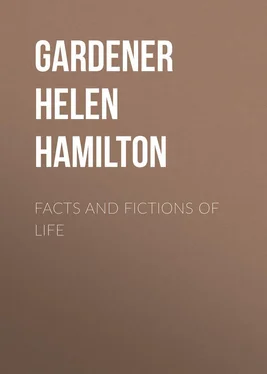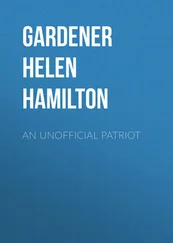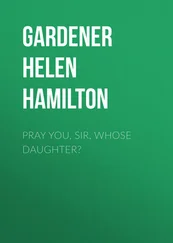Helen Gardener - Facts and Fictions of Life
Здесь есть возможность читать онлайн «Helen Gardener - Facts and Fictions of Life» — ознакомительный отрывок электронной книги совершенно бесплатно, а после прочтения отрывка купить полную версию. В некоторых случаях можно слушать аудио, скачать через торрент в формате fb2 и присутствует краткое содержание. Жанр: foreign_antique, foreign_prose, на английском языке. Описание произведения, (предисловие) а так же отзывы посетителей доступны на портале библиотеки ЛибКат.
- Название:Facts and Fictions of Life
- Автор:
- Жанр:
- Год:неизвестен
- ISBN:нет данных
- Рейтинг книги:4 / 5. Голосов: 1
-
Избранное:Добавить в избранное
- Отзывы:
-
Ваша оценка:
- 80
- 1
- 2
- 3
- 4
- 5
Facts and Fictions of Life: краткое содержание, описание и аннотация
Предлагаем к чтению аннотацию, описание, краткое содержание или предисловие (зависит от того, что написал сам автор книги «Facts and Fictions of Life»). Если вы не нашли необходимую информацию о книге — напишите в комментариях, мы постараемся отыскать её.
Facts and Fictions of Life — читать онлайн ознакомительный отрывок
Ниже представлен текст книги, разбитый по страницам. Система сохранения места последней прочитанной страницы, позволяет с удобством читать онлайн бесплатно книгу «Facts and Fictions of Life», без необходимости каждый раз заново искать на чём Вы остановились. Поставьте закладку, и сможете в любой момент перейти на страницу, на которой закончили чтение.
Интервал:
Закладка:
"Ten dollars."
"Your Honor, I'll lose my place and I've got a wife and – " The officer led him away. Ten dollars meant ten days in prison to him and the loss of his situation. What it may have meant to his family did not transpire.
To the next "case" which was of a similar nature, the fine meant the going down into a well-filled pocket, a laugh with the clerk and the police officer who took the proffered cigar and touched his hat to the object of his arrest, who, having slept off his "plain drunk," was in a rather merry mood. Many of the accused did not hear the charges made against them by the officer; in but few cases were they told that they had a right to counsel; almost all were fined and at least two-thirds of the fines meant imprisonment. A little more care was taken, a little more time spent if the face or clothing of the accused indicated that he was of the well-to-do or educated class. Indeed I left this court feeling that the inequality of the administration of justice as applied by the system of fines was carried to its farthest limit, and that it would be perfectly possible – easy indeed – to find a man (if he chanced to be poor and somewhat common looking) behind prison walls without his knowing even upon what charge he had been put there and without having made the slightest defense. If he were frightened, or ill, or unused to courts, and through uncertainty or slowness of speech, or not knowing what the various steps meant, had suddenly heard the Judge say "Ten dollars," and had realized that so far as he was concerned it might as well have been ten thousand; it was quite possible, I say, for such a man to find himself a convict before he knew or realized what it meant or with what he was charged.
I wondered if all this was necessary, or if attention were called to it from the outside if it might not set people to thinking and if the thought might not result in action that would lead to better things.
I wondered if a rapid picture of a boy of sixteen arrested for fighting, shot through this court into association with criminals for ten days, being found in their company afterward and sent by the criminal court to prison for three months for larceny, and afterward appearing and re-appearing as a long or short term criminal, would suggest to others what the idea suggested to me? I wondered, in short, if there were less machinery for the production and punishment of crime and more for its prevention, if life might not be made less of a battlefield and hospital for the poor or unfortunate. I wondered if the farce of oaths, the flippancy of trials, the passion of the prosecutor for conviction and all the train of evils growing out of these were necessary; and if they were not, I wondered if the vast non-court-attending public might not suggest a remedy if its attention were called to certain of the many suggestive features of our courts that presented themselves to me during my first two days as an observer of the legal machinery that grinds out our criminal population.
THROWN IN WITH THE CITY'S DEAD
I read that headline in a newspaper one morning. Then I asked myself: Why should the city's dead be "thrown in?"
Where and how are they "thrown in?" Why are they thrown in?
Why, in a civilized land, should such an expression as that arouse no surprise – be taken as a matter of course? What is its full meaning? Are others as little informed upon the subject as I? Would the city's dead continue to be "thrown in" if the public stopped to think; if it understood the meaning of that single, obscure headline? Believing that the power of a free and fearless press is the greatest power for good that has yet been devised; and believing most sincerely, that wrongs grow greatest where silence is imposed or ignorance of the facts stands between the wrong doer, or the wrong deed, and enlightened public opinion, I decided to learn and to tell just the meaning — all of the meaning – of those six sadly and shockingly suggestive words.
Suppose you chanced to be very poor and to die in New York; or suppose, unknown to you, your mother, a stranger passing through the city, were to die suddenly. Suppose, in either case, no money were forthcoming to bury the body, would it be treated as well, with as humane and civilized consideration as if the question of money were not in the case? We are fond of talking about giving "tender Christian burial," and of showing horror and disgust for those who may wilfully observe other methods. We are fond of saying that death levels all distinctions. Let us see whether these are facts or fictions of life.
The island where the "city's dead" are buried – that is, all the friendless and poor or unidentified, who are not cared for by some church or society – is a mere scrap of land, from almost any point of which you easily overlook it all, with its marshy border and desolate, unkempt surface. It contains, as the officer in charge told me, about seventy-nine acres at low tide. At high tide much of the border is submerged. Upon this scrap of land – about one mile long and less than half a mile wide at its widest point – is concentrated so much of misery and human sorrow and anguish, that it is difficult to either grasp the idea one's self or convey it to others.
There are three classes of dead sent here by the city. Those who are imbecile or insane – dead to thought or reason; those who are dead to society and hope – medium term criminals; and those whom want, and sorrow, and pain, and wrong can touch no more after the last indignity is stamped upon their dishonored clay. I will deal first with these happier ones who have reached the end of the journey which the other two classes sit waiting for. Or, perhaps some of them stand somewhat defiantly as they look on what they know is to be their own last home, and recognize the estimate placed upon them by civilized, Christian society.
Upon this scrap of land there are already buried – or "thrown in" – over seventy thousand bodies. Stop and think what that means. It is a large city. We have but few larger in this country. Remember that this island is about one mile long and less than a half mile wide at the widest point. In places it is not much wider than Broadway.
The spot on which those seventy thousand are "thrown in" is but a small part of this miniature island. This is laid off in plots with paths between. These sections are forty-five feet by fifteen, and are dug out seven feet deep. Again, stop and picture that. It looks like the beginning of a cellar for a small city house. But in that little cellar are buried one hundred and fifty bodies, packed three deep. Remembering the depth of a coffin, and remembering that a layer of earth is put on each, it is easy to estimate about how near the surface of the earth lie festering seventy thousand bodies. They are not in metallic cases, as may well be imagined; but I need only add that I could distinctly see the corpse through wide cracks in almost every rough board box, for you to understand that sickening odors and deadly gases are nowhere absent.
But there is one thing more to add before this picture can be grasped. Three of these trenches are kept constantly open. This means that something like four hundred bodies, dead from three days to two weeks, lie in open pine boxes almost on the surface of the earth.
You will say, "That is bad, but the island is far away and is for the dead only. They cannot injure each other." If that were true, a part of the ghastly horror would be removed, but, as I have said, the city sends two other classes of dead here. Two classes who are beyond hope, perhaps, but surely not beyond injury and a right to consideration by those who claim to be civilized.
Standing near the "general" or Protestant trench – for while Christian society permits its poor and unknown to be buried in trenches three deep; while it forces its other poor and friendless to dig the trenches and "throw in" their brother unfortunates; while it condemns its imbeciles and lunatics to the sights, and sounds, and odors, and poisoned air and earth of this island, it cannot permit the Catholic and Protestant dead to lie in the same trenches! – standing near the general trench, in air too foul to describe, where five "short term men" were working to lower their brothers, the officer explained.
Читать дальшеИнтервал:
Закладка:
Похожие книги на «Facts and Fictions of Life»
Представляем Вашему вниманию похожие книги на «Facts and Fictions of Life» списком для выбора. Мы отобрали схожую по названию и смыслу литературу в надежде предоставить читателям больше вариантов отыскать новые, интересные, ещё непрочитанные произведения.
Обсуждение, отзывы о книге «Facts and Fictions of Life» и просто собственные мнения читателей. Оставьте ваши комментарии, напишите, что Вы думаете о произведении, его смысле или главных героях. Укажите что конкретно понравилось, а что нет, и почему Вы так считаете.












![John Bruce - The Lettsomian Lectures on Diseases and Disorders of the Heart and Arteries in Middle and Advanced Life [1900-1901]](/books/749387/john-bruce-the-lettsomian-lectures-on-diseases-and-disorders-of-the-heart-and-arteries-in-middle-and-advanced-life-1900-1901-thumb.webp)